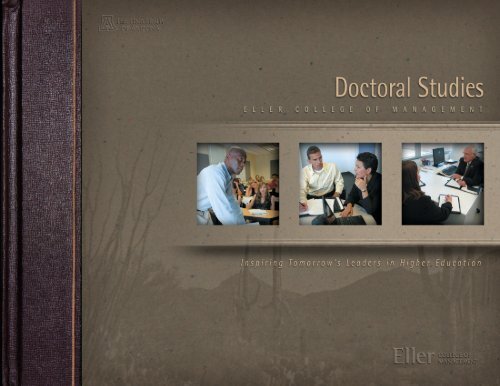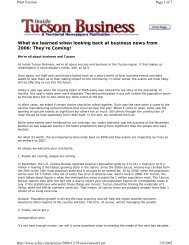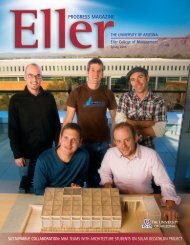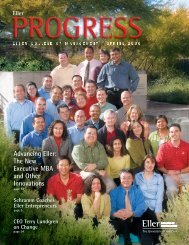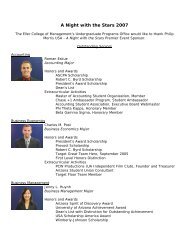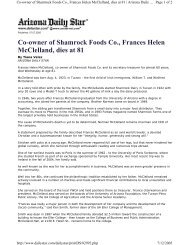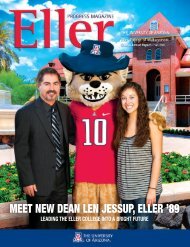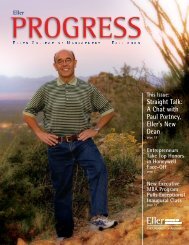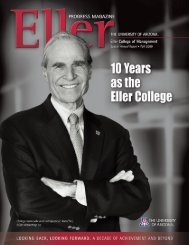VIEW PDF - Eller College of Management - University of Arizona
VIEW PDF - Eller College of Management - University of Arizona
VIEW PDF - Eller College of Management - University of Arizona
You also want an ePaper? Increase the reach of your titles
YUMPU automatically turns print PDFs into web optimized ePapers that Google loves.
Inspiring<br />
Tomorrow’s<br />
Leaders in<br />
Higher<br />
Education<br />
McClelland Pr<strong>of</strong>essor <strong>of</strong> MIS, Sudha Ram,<br />
collaborates with biochemistry pr<strong>of</strong>essor<br />
Tom Baldwin on joint research in<br />
biological information management.
Immerse Yourself in a<br />
CULTURE OF LEARNING<br />
A Ph.D. in management or economics<br />
will prepare you to succeed in<br />
research and teaching. But at The<br />
<strong>University</strong> <strong>of</strong> <strong>Arizona</strong> and the <strong>Eller</strong><br />
<strong>College</strong> <strong>of</strong> <strong>Management</strong>, we believe<br />
the journey is as important as the<br />
final destination <strong>of</strong> a great job<br />
at a prestigious institution.<br />
Our suite <strong>of</strong> Ph.D. programs centers<br />
around critical advantages that will<br />
form the basis <strong>of</strong> your lifelong<br />
pursuit <strong>of</strong> knowledge: the resources<br />
and reputation <strong>of</strong> a top-notch<br />
Research I university; a tight-knit<br />
community; and most importantly,<br />
a support system headed by faculty<br />
mentors who are invested in your<br />
success — who will work to create<br />
peer-to-peer partnerships based<br />
on a shared research interest.<br />
The Ph.D. is a degree for individuals<br />
with the intellectual ambition to<br />
formulate new conclusions through<br />
research and experimentation<br />
and the drive to spark change by<br />
articulating those conclusions in<br />
the classroom and in publication.<br />
It is a degree that gives you the<br />
freedom to ask fascinating<br />
questions and the methodology<br />
to answer them through<br />
self-directed exploration.<br />
At the <strong>Eller</strong> <strong>College</strong> <strong>of</strong> <strong>Management</strong>,<br />
you will immerse yourself in the<br />
topics that feed your imagination<br />
and the problems you are driven to<br />
solve. You will teach classes. You<br />
will formulate an original dissertation.<br />
You will join a valuable network<br />
<strong>of</strong> research leaders in your<br />
field. And you will emerge with a<br />
doctoral degree — as an expert in<br />
your field and a true colleague in<br />
the pr<strong>of</strong>ession.<br />
E L L E R C O L L E G E O F M A N A G E M E N T<br />
1
Individual Programs at a PUBLIC UNIVERSITY<br />
More than 36,000 students attend<br />
The <strong>University</strong> <strong>of</strong> <strong>Arizona</strong>, but you<br />
won’t get lost in the crowd.<br />
Each <strong>of</strong> the <strong>Eller</strong> <strong>College</strong> <strong>of</strong><br />
<strong>Management</strong>’s seven departmental<br />
Ph.D. programs is highly selective,<br />
and admits only a handful <strong>of</strong><br />
candidates annually to create an<br />
intellectual community that fosters<br />
close collaboration and a free<br />
exchange <strong>of</strong> ideas. You will learn in<br />
small classes and work closely with<br />
faculty members to perform critical<br />
analysis <strong>of</strong> existing work and<br />
undertake research projects that<br />
will significantly contribute to the<br />
academic literature <strong>of</strong> your field.<br />
The <strong>University</strong> <strong>of</strong> <strong>Arizona</strong> is among<br />
the top 20 research universities in<br />
the country, with $512 million in<br />
annual research funding and leading<br />
faculty members in a rich array <strong>of</strong><br />
disciplines. The <strong>College</strong> is AACSBaccredited<br />
and the <strong>University</strong> is one <strong>of</strong><br />
only 62 members <strong>of</strong> the Association <strong>of</strong><br />
American Universities, which recognizes<br />
institutions with exceptionally strong<br />
research and academic programs.<br />
2<br />
w w w . e l l e r . a r i z o n a . e d u / a c a d e m i c / d o c t o r a l<br />
Rajan Lal photo.
The <strong>Eller</strong> <strong>College</strong> <strong>of</strong> <strong>Management</strong> at The <strong>University</strong> <strong>of</strong> <strong>Arizona</strong> is internationally<br />
recognized for pioneering research, innovative curriculum, distinguished faculty, excellence<br />
in entrepreneurship, and its top-5 MIS program. The <strong>College</strong> leads the nation’s business<br />
schools in generating grant funds for research and supports more than 4,500 undergraduate<br />
and 600 graduate students on the UA campus in beautiful Tucson, <strong>Arizona</strong>.<br />
Old Main on The <strong>University</strong> <strong>of</strong> <strong>Arizona</strong> campus.<br />
E L L E R C O L L E G E O F M A N A G E M E N T<br />
3
Accounting<br />
Finance<br />
Seven Fields <strong>of</strong> STUDY<br />
The <strong>Eller</strong> <strong>College</strong> <strong>of</strong> <strong>Management</strong> <strong>of</strong>fers a<br />
Ph.D. in <strong>Management</strong> with six concentrations<br />
or a Ph.D. in Economics, designed to<br />
prepare candidates for faculty positions in<br />
academia, or for research in government or<br />
industry. Each <strong>of</strong> these departments is<br />
individually responsible for admittance and<br />
You will focus on a substantive<br />
area — managerial accounting,<br />
financial accounting, auditing,<br />
or tax — then employ an<br />
analytical method such as<br />
mathematical modeling or<br />
archival data analysis to<br />
develop your own original<br />
research. You will also take core<br />
courses to develop expertise<br />
in economics, behavioral<br />
sciences, and quantitative<br />
methods, and gain a detailed<br />
knowledge <strong>of</strong> contemporary<br />
accounting research.<br />
Economics<br />
After completing comprehensive<br />
coursework in modern<br />
concepts and techniques <strong>of</strong><br />
economic theory and econometrics,<br />
you will choose a<br />
faculty mentor and area <strong>of</strong><br />
specialty. Faculty research<br />
strengths include microeconomic<br />
theory, industrial<br />
organization, econometrics,<br />
experimental economics, labor<br />
economics, economic strategy,<br />
natural resource economics,<br />
economic history, and<br />
financial economics.<br />
You will complete coursework in<br />
areas including microeconomic<br />
theory and quantitative<br />
methods in finance before<br />
presenting a dissertation<br />
proposal to a faculty committee.<br />
<strong>Eller</strong> <strong>College</strong> faculty expertise<br />
includes corporate finance<br />
and investments, financial<br />
institutions and market<br />
microstructure, and pricing <strong>of</strong><br />
financial securities. The doctoral<br />
degree in finance also requires<br />
a minor in economics.<br />
funding decisions for its Ph.D. program.<br />
4<br />
w w w . e l l e r . a r i z o n a . e d u / a c a d e m i c / d o c t o r a l
MIS<br />
The doctoral program in<br />
management information<br />
systems (MIS) begins with a<br />
solid foundation in research<br />
methodology. You will complete<br />
courses that combine hands-on<br />
and theoretical work as you<br />
learn to implement, deploy,<br />
and evaluate management<br />
information systems. The<br />
approaches and technologies<br />
include artificial intelligence,<br />
computer science, computersupported<br />
collaboration,<br />
economics, behavioral science,<br />
and management science.<br />
<strong>Management</strong> and<br />
Organizations<br />
You will learn to apply theories<br />
and methodologies from<br />
psychology, sociology, political<br />
science, and management to<br />
study areas such as organizational<br />
behavior, organizational<br />
theory, and judgment/decision<br />
making. In the process, you<br />
will develop an in-depth<br />
understanding <strong>of</strong> individual<br />
behavior, small group and team<br />
behavior, and organizational<br />
structure and processes.<br />
Marketing<br />
You will become pr<strong>of</strong>icient in<br />
marketing and master the<br />
tools and methods <strong>of</strong> empirical<br />
research through required<br />
coursework before selecting<br />
an area <strong>of</strong> specialized study<br />
such as consumer behavior,<br />
retail strategy, relationship<br />
marketing, marketing strategy,<br />
or branding. The program<br />
takes an interdisciplinary<br />
approach and is adaptable to<br />
your pr<strong>of</strong>essional interests.<br />
Public Administration<br />
Coursework in the public<br />
administration program is<br />
interdisciplinary and requires<br />
the completion <strong>of</strong> the MPA<br />
core curriculum. You may<br />
choose an area <strong>of</strong> concentration<br />
from public organization<br />
theory, health care policy and<br />
organization, public finance,<br />
natural resources policy, or<br />
criminal justice. You may also<br />
choose to customize your<br />
focus, as the program is<br />
flexible to suit your<br />
pr<strong>of</strong>essional interests.<br />
Tucson’s Catalina Mountains.<br />
E L L E R C O L L E G E O F M A N A G E M E N T<br />
5
Respected RESEARCH LEADERS<br />
Most <strong>Eller</strong> programs have a 1:1 or even 1:2 student-faculty ratio,<br />
which means that as a doctoral student at the <strong>Eller</strong> <strong>College</strong> <strong>of</strong><br />
<strong>Management</strong>, you will collaborate closely with respected research<br />
leaders in your field <strong>of</strong> interest. The <strong>College</strong> faculty is a dynamic group<br />
with expertise in a broad spectrum <strong>of</strong> areas including information<br />
management, decision making, business ethics, labor issues, taxation,<br />
deception detection, and economics. CVs and detailed information<br />
about the more than 100 faculty at the <strong>Eller</strong> <strong>College</strong> <strong>of</strong> <strong>Management</strong><br />
are available online at www.eller.arizona.edu/academic/doctoral.<br />
PRICE FISHBACK<br />
Ph.D., <strong>University</strong> <strong>of</strong> Washington, 1983<br />
Economics<br />
Economic historian Price Fishback is an<br />
award-winning pr<strong>of</strong>essor who is currently<br />
performing a long-term study <strong>of</strong> the political<br />
economy <strong>of</strong> Roosevelt’s New Deal in the<br />
1930s. He is the editor <strong>of</strong> Government and<br />
the American Economy, A New History.<br />
“The one thing I can say about the faculty is that they push you hard, harder than you think you can go, to really become an outstanding scholar.”<br />
— KIMBERLEY ISETT, Ph.D. ’01<br />
DAN DHALIWAL<br />
Ph.D., The <strong>University</strong> <strong>of</strong> <strong>Arizona</strong>, 1977<br />
Accounting<br />
<strong>Eller</strong> accounting department head<br />
Dan Dhaliwal is an award-winning<br />
educator whose research explores<br />
capital markets, taxes and economic<br />
behavior, and economic factors<br />
affecting management disclosure.<br />
KATHLEEN KAHLE<br />
Ph.D., Ohio State <strong>University</strong>, 1996<br />
Finance<br />
Kathleen Kahle is an expert in<br />
corporate finance, capital structure,<br />
equity issues and repurchases, and<br />
insider trading. Her research has<br />
examined tax benefits <strong>of</strong> employee<br />
stock options and the effect <strong>of</strong><br />
stock options on share repurchases.<br />
6<br />
w w w . e l l e r . a r i z o n a . e d u / a c a d e m i c / d o c t o r a l
SUDHA RAM<br />
Ph.D., <strong>University</strong> <strong>of</strong> Illinois, 1985<br />
MIS<br />
Sudha Ram is the director <strong>of</strong> <strong>Eller</strong>’s<br />
Advanced Database Research<br />
Group, and an expert in enterprise<br />
data management, database<br />
integration, and semantic modeling<br />
and bioinformatics.<br />
RUSSELL CROPANZANO<br />
Ph.D., Purdue <strong>University</strong>, 1988<br />
<strong>Management</strong> and Organizations<br />
Russell Cropanzano’s research is<br />
focused on perceptions <strong>of</strong> workplace<br />
emotion and organizational justice. He<br />
is the co-author <strong>of</strong> the awardwinning<br />
book Organizational Justice<br />
and Human Resources <strong>Management</strong>.<br />
BOB LUSCH<br />
Ph.D., <strong>University</strong> <strong>of</strong> Wisconsin, 1975<br />
Marketing<br />
Bob Lusch’s research and publications<br />
explore areas including marketing<br />
strategy, complex adaptive systems,<br />
marketing channels, marketing and<br />
organizational performance, service<br />
dominant logic <strong>of</strong> marketing, and<br />
resource advantage theory.<br />
KEITH PROVAN<br />
Ph.D., State <strong>University</strong> <strong>of</strong> New York at Buffalo, 1978<br />
Public Administration<br />
Keith Provan is a recognized expert<br />
in organizational networks and<br />
inter-organizational relations. He<br />
focuses on issues <strong>of</strong> governance,<br />
evolution, structure, and effectiveness<br />
in health care, business, and<br />
public and nonpr<strong>of</strong>it sectors.<br />
E L L E R C O L L E G E O F M A N A G E M E N T<br />
7
A Welcoming COMMUNITY<br />
As a doctoral student at the <strong>Eller</strong> <strong>College</strong> <strong>of</strong><br />
<strong>Management</strong>, you will join a collegial group<br />
<strong>of</strong> students in your field, as well as a larger<br />
community <strong>of</strong> approximately 130 Ph.D. students.<br />
In this supportive, informal atmosphere<br />
you will have the opportunity to network with<br />
colleagues, challenge others with your unique<br />
perspective, and be challenged in ways that<br />
will improve your analytical capacity and your<br />
scholarly output.<br />
The coursework is challenging. You will<br />
perform cutting-edge research. And you will<br />
be a part <strong>of</strong> a vibrant intellectual community<br />
in the growing metropolitan area <strong>of</strong> Tucson,<br />
<strong>Arizona</strong>, a community with an ideal climate<br />
for outdoor activity and a thriving cultural<br />
scene — the perfect place to balance<br />
academic work and leisure time.<br />
MICHELLE F. WEINBERGER<br />
Doctoral Student in Marketing<br />
“The program has exceeded my expectations. I am constantly<br />
amazed at the energy that even the most senior faculty devote<br />
to training doctoral students. The Ph.D. program has provided<br />
me with the theoretical and methodological tools to be a productive<br />
and successful researcher.”<br />
MATT PEARSALL<br />
Doctoral Student in <strong>Management</strong> and Organizations<br />
“My relationship with my advisor, Aleksander Ellis, (pictured at<br />
left) has been enormously rewarding. Since the beginning, he has<br />
challenged me to take a lead in designing studies and writing manuscripts<br />
for publication, while providing a safety net <strong>of</strong> guidance<br />
and experience. His constant advice and support is invaluable.”<br />
JOSEPH CULLEN<br />
Doctoral Student in Economics<br />
“When I was selecting a school, the work environment was<br />
a top priority. I chose this department over others because<br />
the faculty are genuinely interested in the success <strong>of</strong> all the<br />
graduate students. There isn't a ‘weed-out’ mentality so<br />
<strong>of</strong>ten encountered in many graduate programs.”<br />
8<br />
w w w . e l l e r . a r i z o n a . e d u / a c a d e m i c / d o c t o r a l
Exceptional RESOURCES<br />
The <strong>Eller</strong> <strong>College</strong> is home to a series <strong>of</strong> laboratories and research groups designed to facilitate your academic<br />
exploration <strong>of</strong> a range <strong>of</strong> topics. As a graduate student, you may apply to work on existing research projects<br />
and conduct your own independent work under the supervision <strong>of</strong> your faculty mentor.<br />
Advanced Database Research Group (ADRG)<br />
ADRG explores semantics, databases, and interoperable systems in business, scientific,<br />
and manufacturing domains.<br />
Artificial Intelligence Laboratory (AI Lab)<br />
This internationally recognized research group explores areas including digital<br />
libraries, intelligent retrieval, knowledge management, medical informatics,<br />
and security informatics.<br />
Center for the <strong>Management</strong> <strong>of</strong> Information (CMI)<br />
Founded in 1985, CMI is an established world leader in research and<br />
development <strong>of</strong> collaboration processes and technologies and currently<br />
focuses on deception detection.<br />
Decision Behavior Laboratory (DBL)<br />
DBL is focused on the study <strong>of</strong> normative, descriptive, and prescriptive<br />
theories <strong>of</strong> human judgment and decision making. The lab facilitates<br />
empirical research from interrelated disciplines including management,<br />
marketing, economics, psychology, and cognitive science.<br />
Economic Science Laboratory (ESL)<br />
Founded in 1985 by 2002 Nobel laureate Vernon Smith, ESL has earned international<br />
recognition as one <strong>of</strong> the world’s leading experimental economics laboratories.<br />
H<strong>of</strong>fman E-Commerce Lab<br />
This lab promotes e-commerce education and research with a focus on<br />
high-end s<strong>of</strong>tware for the development <strong>of</strong> e-commerce systems.<br />
Institute for Behavioral Economics (IBE)<br />
IBE supports research and teaching related to behavioral economics, which combines<br />
economics methods such as game theory, econometrics, and experiments with psychologists’<br />
rich description <strong>of</strong> human behavior.<br />
E L L E R C O L L E G E O F M A N A G E M E N T<br />
9
LYNDA APPLEGATE<br />
Henry R. Byers Pr<strong>of</strong>essor <strong>of</strong> Business<br />
Administration, Harvard Business School<br />
Meaningful OUTCOMES<br />
Graduates from the <strong>Eller</strong> <strong>College</strong> <strong>of</strong><br />
<strong>Management</strong>’s doctoral programs<br />
have gone on to work for Texas<br />
A&M, the <strong>University</strong> <strong>of</strong> Southern<br />
California, Columbia <strong>University</strong>, the<br />
<strong>University</strong> <strong>of</strong> Chicago, Harvard<br />
Business School, and many other<br />
prestigious institutions.<br />
Lynda Applegate photo.<br />
Lynda currently teaches courses on<br />
technology and innovation. She serves<br />
as the chair <strong>of</strong> HBS’ Owner-Managed<br />
Executive Programs and as chair <strong>of</strong> Field<br />
Based Learning in the MBA program. Lynda’s<br />
current research focuses on the challenges<br />
<strong>of</strong> building new ventures and leading radical<br />
business innovation in the face <strong>of</strong> market,<br />
technology, and regulatory turbulence. She<br />
began her academic career at the <strong>University</strong><br />
<strong>of</strong> Michigan, and served on the faculty at<br />
the <strong>University</strong> <strong>of</strong> Washington and The<br />
<strong>University</strong> <strong>of</strong> <strong>Arizona</strong> before joining Harvard<br />
Business School in 1986.<br />
“The <strong>University</strong> <strong>of</strong> <strong>Arizona</strong> Ph.D.<br />
program provided me with the<br />
opportunity to work on cutting-edge<br />
research with leading faculty and<br />
practitioners. I’ve been building on<br />
this foundation ever since.”<br />
10<br />
w w w . e l l e r . a r i z o n a . e d u / a c a d e m i c / d o c t o r a l
KIMBERLEY ROUSSIN ISETT<br />
Assistant Pr<strong>of</strong>essor, Columbia <strong>University</strong>’s<br />
Joseph Mailman School <strong>of</strong> Public Health<br />
EMMANUEL MORALES-CAMARGO<br />
Assistant Pr<strong>of</strong>essor <strong>of</strong> Finance,<br />
<strong>University</strong> <strong>of</strong> New Mexico<br />
Kimberley Rousisin Isett photo.<br />
Kimberley earned a Ph.D. in <strong>Management</strong><br />
with a specialization in organizational<br />
theory in 2001. Her research centers on<br />
the development and evolution <strong>of</strong> social<br />
networks. Recent publications include<br />
analyses <strong>of</strong> strategic responses <strong>of</strong> networks<br />
to coercive pressures, the development <strong>of</strong><br />
new linkages within network settings, and<br />
how institutional forces shape decision<br />
making. She joined the faculty <strong>of</strong> Columbia<br />
<strong>University</strong>’s Joseph L. Mailman School <strong>of</strong><br />
Public Health, Department <strong>of</strong> Health Policy<br />
and <strong>Management</strong>, in August 2004.<br />
Emmanuel Morales-Camargo photo.<br />
Emmanuel earned his Ph.D. in<br />
<strong>Management</strong> with a specialization in<br />
finance in 2006. His research centers<br />
on the effect <strong>of</strong> allocation restrictions<br />
on the efficiency <strong>of</strong> primary stock<br />
markets. Morales-Carmargo joined<br />
the faculty <strong>of</strong> the <strong>University</strong> <strong>of</strong><br />
New Mexico's Anderson School <strong>of</strong><br />
<strong>Management</strong>, Department <strong>of</strong> Finance,<br />
International Business, and Technology<br />
<strong>Management</strong> in August 2006.<br />
“At <strong>Eller</strong>, the sense <strong>of</strong> community<br />
with your graduate cohort is very<br />
strong and it helps you move forward<br />
tremendously. I think I<br />
learned an equal amount from my<br />
peers as I did from pr<strong>of</strong>essors.”<br />
“The most amazing thing about the<br />
coursework at The <strong>University</strong> <strong>of</strong> <strong>Arizona</strong><br />
is that it doesn’t constrain you — you can<br />
draw on people at the top <strong>of</strong> your field<br />
who work in other departments and experience<br />
the full breadth <strong>of</strong> the UA faculty.”<br />
E L L E R C O L L E G E O F M A N A G E M E N T<br />
11
Admissions and FUNDING<br />
At the <strong>Eller</strong> <strong>College</strong> <strong>of</strong> <strong>Management</strong>, Ph.D. admission and funding decisions are<br />
made at the department level. Materials are submitted directly to your academic<br />
department <strong>of</strong> interest, and decision timelines vary. For complete information on<br />
each academic department’s admission requirements, visit<br />
www.eller.arizona.edu/academic/doctoral.<br />
ADMISSIONS<br />
To be admitted as a doctoral student, you must submit applications to both<br />
The <strong>University</strong> <strong>of</strong> <strong>Arizona</strong> Graduate <strong>College</strong> and your department <strong>of</strong> interest<br />
at the <strong>Eller</strong> <strong>College</strong> <strong>of</strong> <strong>Management</strong>. Specific department requirements vary,<br />
but all require GMAT or GRE scores along with completed application and fee.<br />
International students are required to take the TOEFL (Test <strong>of</strong> English as a<br />
Foreign Language).<br />
FUNDING<br />
Most doctoral students at the <strong>Eller</strong> <strong>College</strong> <strong>of</strong> <strong>Management</strong> secure funding through<br />
fellowships and/or research or teaching assistantships. These are awarded on a<br />
competitive basis. Individual departments may award scholarships based on academic<br />
merit or dissertation support. Recipients <strong>of</strong> funding from the <strong>College</strong> also receive a<br />
fee waiver to cover out-<strong>of</strong>-state tuition and registration fees.<br />
CONTACT US<br />
Visit www.eller.arizona.edu/academic/doctoral or review the academic inserts<br />
at the back <strong>of</strong> this brochure to find contact information for your academic<br />
department <strong>of</strong> interest.<br />
General contact information:<br />
Doctoral Programs / <strong>Eller</strong> <strong>College</strong> <strong>of</strong> <strong>Management</strong><br />
520.621.2165<br />
phd@eller.arizona.edu<br />
www.eller.arizona.edu/academic/doctoral<br />
12<br />
w w w . e l l e r . a r i z o n a . e d u / a c a d e m i c / d o c t o r a l<br />
Photos: Thomas Veneklasen Photography unless otherwise noted.<br />
Johnny Wyatt Photography (pages 4-5, 8, back cover);<br />
Kris Hanning (cover-left inset); Rajan Lal (cover-right inset); FotoSmith (page 1).<br />
Design and production: Shevon Johnson Design, Inc.<br />
©2007 The <strong>University</strong> <strong>of</strong> <strong>Arizona</strong> (10/07)
E L L E R C O L L E G E O F M A N A G E M E N T
DOCTORAL PROGRAMS<br />
McClelland Hall Room 405<br />
1130 East Helen Street<br />
Tucson, AZ 85721<br />
520.621.7474<br />
www.eller.arizona.edu/academic/doctoral
ACCOUNTING<br />
<strong>Eller</strong> <strong>College</strong> <strong>of</strong> <strong>Management</strong> l www.eller.arizona.edu/academic/doctoral<br />
The doctoral accounting program leads to a Ph.D. in management grounded on<br />
solid research methods. Core courses develop expertise in economics, behavioral<br />
sciences, and quantitative methods, while providing a detailed knowledge <strong>of</strong><br />
contemporary accounting research. Graduates are strong candidates for faculty<br />
positions at other Research 1 universities.<br />
The Accounting Ph.D. requires two and a half to three years <strong>of</strong> coursework,<br />
followed by preliminary oral and written examinations and a dissertation.<br />
Overall this may take four to five years.<br />
There are usually 13-15 students in the program.<br />
Applicant Qualifications<br />
Applicants should possess a strong<br />
quantitative aptitude as evidenced<br />
by successful coursework in calculus.<br />
Requirements include a four-year<br />
bachelor’s degree with a GPA <strong>of</strong> at<br />
least 3.0, and a GMAT score above<br />
620. International applicants must<br />
take the Test <strong>of</strong> English as a Foreign<br />
Language (TOEFL) and receive a<br />
score <strong>of</strong> 600 (paper based) or<br />
250 (computer based) or higher.<br />
Recent Placements<br />
Recent graduates have gone on to<br />
Oregon, Texas A&M, Washington<br />
<strong>University</strong> at St. Louis, The Ohio State<br />
<strong>University</strong>, Southern California,<br />
Illinois, the <strong>University</strong> <strong>of</strong> Texas at<br />
Austin, <strong>University</strong> <strong>of</strong> Rochester, and<br />
the Universities <strong>of</strong> Chicago.<br />
Dissertations have examined a<br />
diverse range <strong>of</strong> topics in auditing,<br />
tax, and managerial and financial<br />
accounting, based on theory in<br />
economics and psychology and<br />
using econometrics and experimental<br />
methodologies.<br />
FACULTY RESEARCH<br />
Daniel A. Bens<br />
Associate Pr<strong>of</strong>essor and<br />
Rat<strong>of</strong>f Family Fellow<br />
Ph.D., <strong>University</strong> <strong>of</strong> Pennsylvania, 1999<br />
Areas <strong>of</strong> Expertise:<br />
• Financial accounting<br />
Kirsten Cook<br />
Assistant Pr<strong>of</strong>essor<br />
Ph.D., Texas A&M <strong>University</strong>, 2007<br />
Areas <strong>of</strong> Expertise:<br />
• Tax<br />
• Earnings <strong>Management</strong><br />
Mei Cheng<br />
Assistant Pr<strong>of</strong>essor<br />
Ph.D., <strong>University</strong> <strong>of</strong> Southern<br />
California, 2006<br />
Areas <strong>of</strong> Expertise:<br />
• Financial reporting and stock markets<br />
• Role <strong>of</strong> financial analysts<br />
• Voluntary disclosure<br />
Dan S. Dhaliwal<br />
Lou Myers Pr<strong>of</strong>essor <strong>of</strong> Accounting<br />
and Department Head<br />
Ph.D., <strong>University</strong> <strong>of</strong> <strong>Arizona</strong>, 1977<br />
Areas <strong>of</strong> Expertise:<br />
• Capital market research in accounting<br />
• Taxes and economic behavior<br />
• Economic factors affecting<br />
management's choice <strong>of</strong> disclosure<br />
and accounting alternatives<br />
Leslie G. Eldenburg<br />
McClelland Pr<strong>of</strong>essor <strong>of</strong> Accounting<br />
Ph.D., <strong>University</strong> <strong>of</strong> Washington, 1991<br />
Areas <strong>of</strong> Expertise:<br />
• Hospital and healthcare cost and<br />
accounting issues<br />
• Managerial accounting theory<br />
William L. Felix, Jr.<br />
<strong>Eller</strong> Pr<strong>of</strong>essor <strong>of</strong> Accounting<br />
Ph.D., Ohio State <strong>University</strong>, 1970<br />
Areas <strong>of</strong> Expertise:<br />
• Auditor judgment processes<br />
especially in the performance<br />
<strong>of</strong> analytical procedures and<br />
internal control evaluations<br />
• Role <strong>of</strong> audit evidence in opinion<br />
forming and justification<br />
• Role <strong>of</strong> the internal auditor in<br />
financial statement audits<br />
2008-09
ACCOUNTING continued<br />
<strong>Eller</strong> <strong>College</strong> <strong>of</strong> <strong>Management</strong> l www.eller.arizona.edu/academic/doctoral<br />
Theodore H. Goodman<br />
Assistant Pr<strong>of</strong>essor<br />
Ph.D., <strong>University</strong> <strong>of</strong> Pennsylvania, 2005<br />
Areas <strong>of</strong> Expertise:<br />
• Corporate governance<br />
• Institutional investors<br />
• Stock options<br />
• Internal capital markets<br />
Oliver Zhen Li<br />
Associate Pr<strong>of</strong>essor<br />
Ph.D., <strong>University</strong> <strong>of</strong> <strong>Arizona</strong>, 2003<br />
Areas <strong>of</strong> Expertise:<br />
• Financial accounting<br />
• Taxation<br />
Jeffrey Schatzberg<br />
Humberto Lopez Accounting Pr<strong>of</strong>essor<br />
Ph.D., <strong>University</strong> <strong>of</strong> Iowa, 1987<br />
Areas <strong>of</strong> Expertise:<br />
• Behavioral and managerial/cost<br />
accounting<br />
• Auditing issues<br />
William C. Schwartz, Jr.<br />
Assistant Pr<strong>of</strong>essor<br />
Ph.D., <strong>University</strong> <strong>of</strong> Iowa, 2001<br />
Areas <strong>of</strong> Expertise:<br />
• Financial accounting<br />
• Financial statement analysis<br />
• Voluntary disclosure<br />
• Earnings management<br />
Monica Neamtiu<br />
Assistant Pr<strong>of</strong>essor<br />
Ph.D., Pennsylvania State <strong>University</strong>,<br />
2006<br />
Areas <strong>of</strong> Expertise:<br />
• Capital market research in accounting<br />
• Financial reporting issues<br />
• Earnings management<br />
Mark A. Trombley<br />
Beach Fleischman Pr<strong>of</strong>essor<br />
Ph.D., <strong>University</strong> <strong>of</strong> Washington, 1990<br />
Areas <strong>of</strong> Expertise:<br />
• Financial accounting<br />
• Financial statement analysis<br />
William S. Waller<br />
DeLoitte & Touche Pr<strong>of</strong>essor<br />
Ph.D., <strong>University</strong> <strong>of</strong> Washington, 1981<br />
Areas <strong>of</strong> Expertise:<br />
• Behavioral accounting and auditing<br />
Application Questions:<br />
Jenny Lewis<br />
520.626.5879<br />
jennyl@eller.arizona.edu<br />
DOCTORAL PROGRAMS<br />
McClelland Hall Room 405<br />
1130 East Helen Street, Tucson, AZ 85721<br />
520.621.7474<br />
phd@eller.arizona.edu
ECONOMICS<br />
<strong>Eller</strong> <strong>College</strong> <strong>of</strong> <strong>Management</strong> l www.eller.arizona.edu/academic/doctoral<br />
The <strong>Eller</strong> <strong>College</strong> <strong>of</strong> <strong>Management</strong>’s economics faculty has long been among<br />
the world's best in experimental economics and in economic history. The<br />
department also maintains a strong focus on microeconomics, particularly<br />
industrial organization and labor economics.<br />
In addition to a concentration in financial economics, we also <strong>of</strong>fer a Ph.D. in<br />
agricultural and resource economics in conjunction with the Department <strong>of</strong><br />
Agricultural and Resource Economics.<br />
The Department encourages extensive faculty-student interaction by maintaining<br />
a relatively small doctoral program and by selecting students whose interests<br />
are consistent with our faculty members' research.<br />
This faculty-student interaction generally leads to productive research collaborations;<br />
nearly every student who has received a Ph.D. in the Department has<br />
written articles jointly with one or more <strong>of</strong> the Department's faculty members.<br />
Applicant Qualifications<br />
Applicants must have a bachelor’s<br />
degree or equivalent from a<br />
recognized institution. Students are<br />
expected to have completed and<br />
performed well in courses that<br />
correspond to the UA courses in<br />
microeconomics, calculus and<br />
vector calculus, and linear algebra.<br />
Application requires GRE (Graduate<br />
Record Examination) scores.<br />
International applicants must take<br />
the Test <strong>of</strong> English as a Foreign<br />
Language (TOEFL).<br />
Recent Placements<br />
The doctoral program is relatively<br />
small, and when students complete<br />
the program the faculty makes<br />
extensive efforts to place them in<br />
positions that match their skills. The<br />
department’s graduates have accepted<br />
faculty positions at UC Irvine, UC<br />
Riverside, Washington <strong>University</strong>,<br />
Ohio State, <strong>University</strong> <strong>of</strong> Florida, and<br />
many others. Others have accepted<br />
post-doctoral research positions<br />
at Yale, Columbia <strong>University</strong>, UC<br />
Davis, Baylor <strong>University</strong>, the<br />
<strong>University</strong> <strong>of</strong> Chicago, and the Max<br />
Planck Institute <strong>of</strong> Economics.<br />
FACULTY RESEARCH<br />
Rabah Amir<br />
<strong>Eller</strong> Pr<strong>of</strong>essor<br />
Ph.D., <strong>University</strong> <strong>of</strong> Illinois (Urbana), 1985<br />
Areas <strong>of</strong> Expertise:<br />
• Industrial organization<br />
• Microeconomics<br />
• Game theory<br />
• Uncertainty and economic dynamics<br />
Manuela Angelucci<br />
Assistant Pr<strong>of</strong>essor<br />
Ph.D., <strong>University</strong> <strong>College</strong> London, 2004<br />
Areas <strong>of</strong> Expertise:<br />
• Labor economics<br />
• Applied econometrics<br />
• Development economics<br />
Anna Breman<br />
Assistant Pr<strong>of</strong>essor<br />
Ph.D., Stockholm School <strong>of</strong> Economics,<br />
2006<br />
Areas <strong>of</strong> Expertise:<br />
• Behavioral Economics<br />
• Experiments<br />
• Public Finance<br />
Gregory S. Crawford<br />
Associate Pr<strong>of</strong>essor<br />
Ph.D., Stanford <strong>University</strong>, 1998<br />
Areas <strong>of</strong> Expertise:<br />
• Industrial organization<br />
• Econometrics<br />
John Z. Drabicki<br />
Associate Pr<strong>of</strong>essor and Assistant<br />
Department Head<br />
Ph.D., Purdue <strong>University</strong>, 1974<br />
Areas <strong>of</strong> Expertise:<br />
• Macroeconomics<br />
• International economics<br />
• Applied microeconomic theory<br />
Martin Dufwenberg<br />
<strong>Eller</strong> Pr<strong>of</strong>essor<br />
Ph.D., Uppsala <strong>University</strong>, 1995<br />
Areas <strong>of</strong> Expertise:<br />
• Game theory<br />
• Experiments<br />
• Behavioral economics<br />
Price V. Fishback<br />
Frank and Clara Kramer Pr<strong>of</strong>essor<br />
Ph.D., <strong>University</strong> <strong>of</strong> Washington, 1983<br />
Areas <strong>of</strong> Expertise:<br />
• Economic history<br />
• Labor economics<br />
• Political economy<br />
Jonah Gelbach<br />
Associate Pr<strong>of</strong>essor and <strong>Eller</strong> Fellow<br />
Ph.D., MIT, 1998<br />
Areas <strong>of</strong> Expertise:<br />
• Labor economics<br />
• Public finance<br />
• Economics <strong>of</strong> law<br />
• Applied econometrics<br />
2008-09
ECONOMICS continued<br />
<strong>Eller</strong> <strong>College</strong> <strong>of</strong> <strong>Management</strong> l www.eller.arizona.edu/academic/doctoral<br />
Gautam Gowrisankaran<br />
Associate Pr<strong>of</strong>essor and<br />
McCoy/Rogers Fellow<br />
Ph.D., Yale <strong>University</strong>, 1995<br />
Areas <strong>of</strong> Expertise:<br />
• Industrial organization<br />
• Health economics<br />
• Applied econometrics<br />
Keisuke Hirano<br />
McCoy-Rogers Fellow and<br />
Associate Pr<strong>of</strong>essor<br />
Ph.D., Harvard <strong>University</strong>, 1998<br />
Area <strong>of</strong> Expertise:<br />
• Microeconometrics<br />
James C. McBrearty<br />
Associate Pr<strong>of</strong>essor<br />
Ph.D., <strong>University</strong> <strong>of</strong> Illinois, 1968<br />
Areas <strong>of</strong> Expertise:<br />
• Arbitration<br />
• Collective bargaining<br />
• Employment law<br />
Ronald L. Oaxaca<br />
McClelland Pr<strong>of</strong>essor<br />
Ph.D., Princeton <strong>University</strong>, 1971<br />
Areas <strong>of</strong> Expertise:<br />
• Labor economics<br />
• Applied econometrics<br />
• Applied microeconomics<br />
David E. Pingry<br />
Pr<strong>of</strong>essor <strong>of</strong> <strong>Management</strong> Information<br />
Systems and Economics<br />
Ph.D., Purdue <strong>University</strong>, 1971<br />
Areas <strong>of</strong> Expertise:<br />
• Decision support systems<br />
• Microeconomics<br />
• Environmental economics<br />
Paul Portney<br />
Dean, Pr<strong>of</strong>essor, and Halle Chair<br />
in Leadership<br />
Ph.D., Northwestern <strong>University</strong>, 1973<br />
Areas <strong>of</strong> Expertise:<br />
• Environmental and resource economics<br />
• Applied welfare economics<br />
David H. Reiley<br />
APS Pr<strong>of</strong>essor<br />
Ph.D., MIT, 1996<br />
Areas <strong>of</strong> Expertise:<br />
• Experimental economics<br />
• Industrial organization<br />
Stanley S. Reynolds<br />
SRP Pr<strong>of</strong>essor <strong>of</strong> Technology, Public Policy,<br />
and Markets<br />
Ph.D., Northwestern <strong>University</strong>, 1983<br />
Areas <strong>of</strong> Expertise:<br />
• Industrial organization<br />
• Applied microeconomic theory<br />
• Experimental economics<br />
Paul Rhode<br />
McClelland Pr<strong>of</strong>essor <strong>of</strong> Economics<br />
Ph.D., Stanford <strong>University</strong>, 1990<br />
Areas <strong>of</strong> Expertise:<br />
• Economic history<br />
Mark Schankerman<br />
Pr<strong>of</strong>essor and James and Pamela Muzzy<br />
Chair in Entrepreneurship<br />
Executive Director, McGuire Center<br />
for Entrepreneurship<br />
Ph.D., Harvard <strong>University</strong>, 1979<br />
Areas <strong>of</strong> Expertise:<br />
• Entrepreneurship<br />
• Industrial economics and regulation<br />
• Applied micro-econometrics<br />
• Transition economics<br />
Kenneth R. Smith<br />
<strong>Eller</strong> Distinguished Service Pr<strong>of</strong>essor<br />
Ph.D., Northwestern <strong>University</strong>, 1968<br />
Areas <strong>of</strong> Expertise:<br />
• Microeconomics<br />
• Health economics<br />
Mark Stegeman<br />
Associate Pr<strong>of</strong>essor<br />
Ph.D., Massachusetts Institute <strong>of</strong><br />
Technology, 1987<br />
Areas <strong>of</strong> Expertise:<br />
• Microeconomic theory<br />
• Game theory<br />
• Industrial organization<br />
Gerald J. Swanson<br />
Pr<strong>of</strong>essor and Thomas R. Brown Chair<br />
in Economic Education<br />
Ph.D., <strong>University</strong> <strong>of</strong> Illinois, 1971<br />
Areas <strong>of</strong> Expertise:<br />
• Public finance<br />
• Economic education<br />
• Health economics<br />
Mark Walker<br />
Department Head and <strong>Eller</strong> Pr<strong>of</strong>essor<br />
<strong>of</strong> Economics<br />
Ph.D., Purdue <strong>University</strong>, 1970<br />
Areas <strong>of</strong> Expertise:<br />
• Microeconomic theory<br />
• Game theory<br />
• Experimental economics<br />
John C. Wooders<br />
Freshwater Pr<strong>of</strong>essor<br />
Ph.D., Cornell <strong>University</strong>, 1992<br />
Areas <strong>of</strong> Expertise:<br />
• Microeconomic theory<br />
• Game theory<br />
• Experimental economics<br />
Jianjun Wu<br />
Assistant Pr<strong>of</strong>essor<br />
Ph.D., Northwestern <strong>University</strong>, 2005<br />
Areas <strong>of</strong> Expertise:<br />
• Industrial organization<br />
• Applied microeconomics<br />
• Business strategy<br />
• Economics <strong>of</strong> information<br />
Mo Xiao<br />
Assistant Pr<strong>of</strong>essor<br />
Ph.D., <strong>University</strong> <strong>of</strong> California,<br />
Los Angeles, 1997<br />
Areas <strong>of</strong> Expertise:<br />
• Industrial organization<br />
• Applied microeconomics<br />
Application and Advising Questions:<br />
Lana Sooter<br />
520.621.2821<br />
lsooter@eller.arizona.edu<br />
DOCTORAL PROGRAMS<br />
McClelland Hall Room 405<br />
1130 East Helen Street, Tucson, AZ 85721<br />
520.621.7474<br />
phd@eller.arizona.edu
FINANCE<br />
<strong>Eller</strong> <strong>College</strong> <strong>of</strong> <strong>Management</strong> l www.eller.arizona.edu/academic/doctoral<br />
The doctoral program in finance at the <strong>Eller</strong> <strong>College</strong> <strong>of</strong> <strong>Management</strong> primarily<br />
prepares its graduates for careers as university pr<strong>of</strong>essors, with research agendas<br />
in corporate finance, financial institutions, and market microstructure, and the<br />
pricing <strong>of</strong> financial securities. The faculty members, with degrees from internationally<br />
recognized universities, conduct research in these areas. Students have<br />
opportunities to work with faculty through small classes and ongoing research<br />
projects to develop the methodological and analytical tools needed for research<br />
and teaching.<br />
The duration <strong>of</strong> the program is approximately four years, with the first two years<br />
<strong>of</strong> study dedicated to coursework in finance and economics. After completion <strong>of</strong><br />
the first year <strong>of</strong> study, students demonstrate their competency in economics<br />
through a minor exam in economic theory or econometrics. Students also begin<br />
to formulate research projects <strong>of</strong> their own and present a research proposal to<br />
the faculty during the second year <strong>of</strong> study. The emphasis during the third and<br />
fourth years <strong>of</strong> the program is on writing a dissertation and coursework in a<br />
more narrow area <strong>of</strong> interest, demonstrating the student's ability to produce<br />
advanced research in finance.<br />
Applicant Qualifications<br />
The finance department admits<br />
highly qualified, motivated, and<br />
quantitatively-skilled students<br />
interested in pursuing independent<br />
research projects. Admission<br />
depends on the student's ability to<br />
complete the program as evidenced<br />
by his or her undergraduate record<br />
(minimum GPA 3.50), GMAT (minimum<br />
650) and/or GRE scores, and<br />
letters <strong>of</strong> recommendation. The<br />
department awards research and<br />
teaching assistantships to help<br />
defray the student's expenses.<br />
Recent Placements<br />
Recent graduates have gone on to<br />
teach at institutions including<br />
Southern Illinois <strong>University</strong><br />
Carbondale, SKK Graduate School<br />
<strong>of</strong> Business at Sungkyunkwan<br />
<strong>University</strong>, and the <strong>University</strong> <strong>of</strong><br />
New Mexico in Albuquerque. Others<br />
have gone on to accept research<br />
positions with firms such as<br />
PanAgora Asset <strong>Management</strong>.<br />
FACULTY RESEARCH<br />
Thomas W. Bates<br />
Assistant Pr<strong>of</strong>essor<br />
Ph.D., The <strong>University</strong> <strong>of</strong> Pittsburgh,<br />
2000<br />
Areas <strong>of</strong> Expertise:<br />
• Corporate finance<br />
• Corporate governance<br />
• Mergers and acquisitions<br />
• Valuation<br />
Edward A. Dyl<br />
Sheafe/Estes Pr<strong>of</strong>essor <strong>of</strong> Finance<br />
Ph.D., Stanford <strong>University</strong>, 1973<br />
Areas <strong>of</strong> Expertise:<br />
• Valuation<br />
• Securities fraud<br />
• Investments<br />
• Corporation finance<br />
• Investment banking<br />
• Real estate<br />
George Jiang<br />
Assistant Pr<strong>of</strong>essor<br />
Ph.D., <strong>University</strong> <strong>of</strong> Western Ontario,<br />
1996<br />
Areas <strong>of</strong> Expertise:<br />
• Applied finance<br />
• Financial econometrics<br />
Kathleen Kahle<br />
Associate Pr<strong>of</strong>essor and Susan<br />
Bulkeley Butler Fellow<br />
Ph.D., The Ohio State <strong>University</strong>, 1996<br />
Areas <strong>of</strong> Expertise:<br />
• Corporate finance<br />
• Capital structure<br />
• Equity issues and repurchases<br />
• Insider trading<br />
Ivalina Kalcheva<br />
Assistant Pr<strong>of</strong>essor<br />
Ph.D., <strong>University</strong> <strong>of</strong> Utah, 2007<br />
Areas <strong>of</strong> Expertise:<br />
• Market microstructure<br />
• Investments<br />
Eric Kelley<br />
Assistant Pr<strong>of</strong>essor<br />
Ph.D.,Texas A&M <strong>University</strong>, 2004<br />
Areas <strong>of</strong> Expertise:<br />
• Market efficiency<br />
• Institutional investors<br />
• International corporate governance<br />
Sandy Klasa<br />
Assistant Pr<strong>of</strong>essor<br />
Ph.D., <strong>University</strong> <strong>of</strong> Oregon, 2002<br />
Areas <strong>of</strong> Expertise:<br />
• Corporate governance<br />
• Mergers and acquisitions<br />
• Entrepreneurial finance
FINANCE continued<br />
<strong>Eller</strong> <strong>College</strong> <strong>of</strong> <strong>Management</strong> l www.eller.arizona.edu/academic/doctoral<br />
Christopher Lamoureux<br />
Department Head and Diamond<br />
Pr<strong>of</strong>essor<br />
Ph.D., Syracuse <strong>University</strong>, 1985<br />
Areas <strong>of</strong> Expertise:<br />
• Analysis <strong>of</strong> financial markets<br />
William Maxwell<br />
Associate Pr<strong>of</strong>essor and Richard<br />
& Tricia Calta Fellow<br />
Ph.D., The George Washington<br />
<strong>University</strong>, 1998<br />
Areas <strong>of</strong> Expertise:<br />
• Corporate finance<br />
• Debt markets<br />
• Corporate governance<br />
Application and Advising Questions:<br />
Kay Ross<br />
520.621.1520<br />
kross@eller.arizona.edu<br />
DOCTORAL PROGRAMS<br />
McClelland Hall Room 405<br />
1130 East Helen Street, Tucson, AZ 85721<br />
520.621.7474<br />
phd@eller.arizona.edu
MANAGEMENT AND ORGANIZATIONS<br />
<strong>Eller</strong> <strong>College</strong> <strong>of</strong> <strong>Management</strong> l www.eller.arizona.edu/academic/doctoral<br />
The management and organizations doctoral program at the <strong>Eller</strong> <strong>College</strong> <strong>of</strong><br />
<strong>Management</strong> is full-time and requires four to five years <strong>of</strong> work. Fields <strong>of</strong> study<br />
include organizational behavior/human resource management, strategy and organizational<br />
theory, and judgment and decision making. Only a small number <strong>of</strong> Ph.D.<br />
students are admitted each year, enabling students to work closely with faculty<br />
members and acquire a solid foundation in theory formulation, research design, and<br />
methodological skills.<br />
The department’s faculty consistently publish in top-tier journals such as Academy<br />
<strong>of</strong> <strong>Management</strong> Journal, Administrative Science Quarterly, Organizational Behavior<br />
and Human Decision Processes, Journal <strong>of</strong> Applied Psychology, and Personnel<br />
Psychology. Several faculty members are serving as editors <strong>of</strong> top journals and many<br />
serve on a multiple editorial boards.<br />
Students are encouraged to participate in a variety <strong>of</strong> research topics and have<br />
access to a number <strong>of</strong> support tools, including the Decision Behavior Laboratory and<br />
an expansive subject pool. Students also enjoy a 1:2 student-to-faculty ratio, minimal<br />
teaching loads, small class sizes, a collegial atmosphere, and competitive funding.<br />
By focusing on research, doctoral students in management and organizations<br />
are able to successfully compete in the academic marketplace upon graduation.<br />
Applicant Qualifications<br />
Applicants must meet admission requirements <strong>of</strong> both the Graduate <strong>College</strong> and<br />
the department <strong>of</strong> management and organizations. Minimum requirements include<br />
a 3.0 GPA with emphasis placed on upper-level undergraduate and prior graduatelevel<br />
academic performance, bachelor’s degree, math pr<strong>of</strong>iciency (college calculus<br />
plus introductory probability and descriptive statistics), and GRE or GMAT scores.<br />
International applicants must take the Test <strong>of</strong> English as a Foreign Language<br />
(TOEFL) and receive a score <strong>of</strong> 550 (paper based) or 244 (computer based) or higher.<br />
Recent Placements<br />
The department has helped place students in teaching positions at institutions<br />
including <strong>University</strong> <strong>of</strong> Maryland, Washington <strong>University</strong>, Columbia <strong>University</strong>,<br />
California State <strong>University</strong> Sacramento, Australian Graduate School <strong>of</strong><br />
<strong>Management</strong>, <strong>University</strong> <strong>of</strong> Montana, and Eastern Connecticut State <strong>University</strong>.<br />
FACULTY RESEARCH<br />
Lehman Benson III<br />
McCoy/Rogers Fellow and<br />
Associate Pr<strong>of</strong>essor<br />
Ph.D., Lund <strong>University</strong>, 1993<br />
Areas <strong>of</strong> Expertise:<br />
• Effect <strong>of</strong> time constraints on<br />
judgment and decision making<br />
Steven Boivie<br />
Assistant Pr<strong>of</strong>essor<br />
Ph.D., <strong>University</strong> <strong>of</strong> Texas at Austin, 2006<br />
Areas <strong>of</strong> Expertise:<br />
• Board <strong>of</strong> directors and<br />
corporate governance<br />
• Top management teams<br />
• Innovation and technology<br />
Joseph P. Broschak<br />
Associate Pr<strong>of</strong>essor<br />
Ph.D., <strong>University</strong> <strong>of</strong> Texas at Austin, 1999<br />
Areas <strong>of</strong> Expertise:<br />
• Mobility in pr<strong>of</strong>essional and<br />
managerial labor markets<br />
• Formation and dissolution <strong>of</strong> market<br />
relationships between firms<br />
• Nonstandard work arrangements and<br />
labor market intermediaries<br />
• Demographic composition <strong>of</strong><br />
organizations<br />
Russell Cropanzano<br />
Lesk Pr<strong>of</strong>essor <strong>of</strong> <strong>Management</strong><br />
and Organizations<br />
Ph.D., Purdue <strong>University</strong> 1988<br />
Areas <strong>of</strong> Expertise:<br />
• Workplace fairness<br />
• Positive organizational behavior<br />
Terry Connolly<br />
FINOVA Pr<strong>of</strong>essor <strong>of</strong> <strong>Management</strong><br />
and Organizations<br />
Ph.D., Northwestern <strong>University</strong>, 1972<br />
Areas <strong>of</strong> Expertise:<br />
• Decision behavior<br />
• Judgment and choice<br />
• Organizational decision processes<br />
• Creativity<br />
Aleksander P.J. Ellis<br />
Associate Pr<strong>of</strong>essor<br />
Ph.D., Michigan State <strong>University</strong>, 2003<br />
Areas <strong>of</strong> Expertise:<br />
• Emergent cognition and behavioral<br />
processes in groups and teams<br />
• Coping with organizational stress<br />
• Training implementation and design<br />
Stephen W. Gilliland<br />
Arnold Lesk Chair in Leadership,<br />
Pr<strong>of</strong>essor, and Department Head<br />
Ph.D., Michigan State <strong>University</strong>, 1992<br />
Areas <strong>of</strong> Expertise:<br />
• Organizational justice <strong>of</strong> managerial<br />
and human resources management<br />
decisions<br />
• Ethics and socially responsible<br />
leadership<br />
2008-09
MANAGEMENT AND ORGANIZATIONS continued<br />
<strong>Eller</strong> <strong>College</strong> <strong>of</strong> <strong>Management</strong> l www.eller.arizona.edu/academic/doctoral<br />
Barry Goldman<br />
Associate Pr<strong>of</strong>essor<br />
Ph.D., <strong>University</strong> <strong>of</strong> Maryland, 1998<br />
Areas <strong>of</strong> Expertise:<br />
• Organizational justice<br />
• Legal-claiming in organizations<br />
• Employment discrimination<br />
• Conflict management<br />
• Negotiations<br />
Barbara A. Gutek<br />
<strong>Eller</strong> Chair in Women and Leadership<br />
and Pr<strong>of</strong>essor<br />
Ph.D., <strong>University</strong> <strong>of</strong> Michigan, 1975<br />
Areas <strong>of</strong> Expertise:<br />
• Gender and leadership<br />
• Discrimination and the law<br />
• Customer service<br />
Kenneth W. Koput<br />
Associate Pr<strong>of</strong>essor<br />
Ph.D., <strong>University</strong> <strong>of</strong> California at<br />
Berkeley, 1992<br />
Areas <strong>of</strong> Expertise:<br />
• Social and organizational networks<br />
• Garbage-can decision processes<br />
• Path dependent dynamics<br />
Tamar Kugler<br />
Assistant Pr<strong>of</strong>essor<br />
Ph.D., The Hebrew <strong>University</strong> <strong>of</strong><br />
Jerusalem, 2004<br />
Areas <strong>of</strong> Expertise:<br />
• Strategic decision making in groups<br />
and individuals<br />
• Inter-group conflict<br />
Lisa D. Ordóñez<br />
Levine Family Faculty Fellow<br />
and Pr<strong>of</strong>essor<br />
Ph.D., <strong>University</strong> <strong>of</strong> California at<br />
Berkeley, 1994<br />
Areas <strong>of</strong> Expertise:<br />
• Judgment and decision making with<br />
applications in management and<br />
consumer behavior<br />
Nathan P. Podsak<strong>of</strong>f<br />
Assistant Pr<strong>of</strong>essor<br />
Ph.D., <strong>University</strong> <strong>of</strong> Florida, 2007<br />
Areas <strong>of</strong> Expertise:<br />
• Leadership<br />
• Organizational stress<br />
• Measurement and modeling issues<br />
in research methods<br />
Keith G. Provan<br />
<strong>Eller</strong> Pr<strong>of</strong>essor <strong>of</strong> <strong>Management</strong><br />
and Organizations<br />
Ph.D., State <strong>University</strong> <strong>of</strong> New York<br />
at Buffalo, 1977<br />
Areas <strong>of</strong> Expertise:<br />
• Interorganizational relations<br />
and networks<br />
• Health services organizations<br />
Amnon Rapoport<br />
Karl <strong>Eller</strong> Pr<strong>of</strong>essor <strong>of</strong> <strong>Management</strong><br />
and Organizations<br />
Ph.D., <strong>University</strong> <strong>of</strong> North Carolina at<br />
Chapel Hill, 1965<br />
Areas <strong>of</strong> Expertise:<br />
• Individual and interactive<br />
decision making<br />
• Behavioral game theory<br />
Jerel E. Slaughter<br />
Associate Pr<strong>of</strong>essor<br />
Ph.D., Bowling Green State <strong>University</strong>,<br />
2000<br />
Areas <strong>of</strong> Expertise:<br />
• Minority applicants' reactions to<br />
affirmative action<br />
• Personality theory<br />
• Corporate image and applicant<br />
attraction<br />
• Person-organization fit<br />
• Employer and job-seeker decision<br />
making in recruitment and selection<br />
Advising Questions:<br />
Dr. Jerel Slaughter<br />
520.621.7632<br />
jslaught@eller.arizona.edu<br />
Application Questions:<br />
Lori Topp<br />
520.621.7463<br />
ltopp@email.arizona.edu<br />
DOCTORAL PROGRAMS<br />
McClelland Hall Room 405<br />
1130 East Helen Street, Tucson, AZ 85721<br />
520.621.7474<br />
phd@eller.arizona.edu
MANAGEMENT INFORMATION SYSTEMS<br />
<strong>Eller</strong> <strong>College</strong> <strong>of</strong> <strong>Management</strong> l www.eller.arizona.edu/academic/doctoral<br />
The management information systems (MIS) department at the <strong>Eller</strong> <strong>College</strong> <strong>of</strong><br />
<strong>Management</strong> pioneered one <strong>of</strong> the first MIS programs in the world. The department<br />
is one <strong>of</strong> only three programs in the U.S. that has been ranked among the top five<br />
since the inception <strong>of</strong> these rankings in 1989 by U.S. News and World Report.<br />
The faculty consists <strong>of</strong> highly productive and leading scholars in various areas<br />
<strong>of</strong> MIS research. Working under faculty supervision, our Ph.D. students typically<br />
complete a significant number <strong>of</strong> publications in referred conferences and<br />
well-known journals.<br />
The program starts with a solid foundation in research methodology, <strong>of</strong>fering a<br />
unique synthesis <strong>of</strong> state-<strong>of</strong>-the-art technologies and approaches from artificial<br />
intelligence, computer science, computer-supported collaboration, economics, behavioral<br />
science, and management science. There is a mix <strong>of</strong> hands-on and theoretical<br />
work through which students learn how to implement, deploy, and evaluate<br />
management information systems that are <strong>of</strong> interest to academia and industry alike.<br />
Applicant Qualifications<br />
Students must have at least an equivalent <strong>of</strong> a U.S. bachelor’s degree and strong<br />
knowledge <strong>of</strong> a high-level programming language. A master’s degree is not required<br />
for admission. Students must have a GMAT score <strong>of</strong> 650 or above or a GRE score<br />
in the 90th percentile or above for an application to be considered. International<br />
applicants must take the Test <strong>of</strong> English as a Foreign Language (TOEFL) and receive a<br />
score <strong>of</strong> 600 (paper based) or 250 (computer based) or higher. The TOEFL score must<br />
be less than two years old at the time the student begins his or her first class.<br />
Recent Placements<br />
Since 1974, the department has placed over 150 Ph.D. graduates in MIS at many<br />
prestigious universities such as Carnegie Mellon <strong>University</strong>, Harvard <strong>University</strong>,<br />
Pennsylvania State <strong>University</strong>, the <strong>University</strong> <strong>of</strong> Texas at Austin, the <strong>University</strong> <strong>of</strong><br />
Michigan, the <strong>University</strong> <strong>of</strong> Minnesota, and the <strong>University</strong> <strong>of</strong> Pennsylvania. Ph.D.<br />
students were also placed in Fortune 500 companies such as Google, Hewlett<br />
Packard, IBM, and government agencies such as, the National Science Foundation,<br />
the U.S. Air Force, and the U.S. Navy.<br />
FACULTY RESEARCH<br />
Susan Brown<br />
Associate Pr<strong>of</strong>essor<br />
Ph.D., <strong>University</strong> <strong>of</strong> Minnesota, 1997<br />
Areas <strong>of</strong> Expertise:<br />
• Adoption and diffusion <strong>of</strong><br />
information technology<br />
• Computer-supported communication<br />
• Knowledge-oriented systems<br />
• Knowledge management and<br />
e-learning<br />
Hsinchun Chen<br />
McClelland Pr<strong>of</strong>essor <strong>of</strong> MIS<br />
Director, Artificial Intelligence Lab<br />
Ph.D., New York <strong>University</strong>, 1989<br />
Areas <strong>of</strong> Expertise:<br />
• Knowledge management and<br />
business intelligence<br />
• Digital library and search engines<br />
• Data mining, text mining, and<br />
web mining<br />
• Medical informatics and<br />
security informatics<br />
Moshe Dror<br />
<strong>Eller</strong> Pr<strong>of</strong>essor<br />
Ph.D., <strong>University</strong> <strong>of</strong> Maryland, 1983<br />
Areas <strong>of</strong> Expertise:<br />
• Cooperative game theory and cost<br />
allocation in inventory supply chain<br />
management<br />
• Applied combinational optimization in<br />
transportation, logistics, and<br />
manufacturing<br />
• Intelligent solution systems for<br />
operations scheduling<br />
Alexandra Durcikova<br />
Assistant Pr<strong>of</strong>essor<br />
Ph.D., <strong>University</strong> <strong>of</strong> Pittsburgh, 2004<br />
Areas <strong>of</strong> Expertise:<br />
• Knowledge management<br />
• Knowledge repositories<br />
• IT implementation<br />
• <strong>Management</strong> information systems<br />
Paulo Goes<br />
Salter Pr<strong>of</strong>essor and Department Head<br />
Ph.D., <strong>University</strong> <strong>of</strong> Rochester, 1991<br />
Areas <strong>of</strong> Expertise:<br />
• Information technology evaluation<br />
• Electronic Markets<br />
• On-line auctions<br />
• Database and data warehousing<br />
technology and systems<br />
• Database security and confidentiality<br />
protection<br />
• Technology infrastructure<br />
• Network design and performance<br />
• Modeling <strong>of</strong> complex production and<br />
information systems<br />
Jay F. Nunamaker<br />
Regents Pr<strong>of</strong>essor, Soldwedel Chair in<br />
<strong>Management</strong> Information Systems,<br />
and Director <strong>of</strong> the Center for the<br />
<strong>Management</strong> <strong>of</strong> Information<br />
Ph.D., Case Western Reserve <strong>University</strong>,<br />
1969<br />
Areas <strong>of</strong> Expertise:<br />
• Collaboration technology<br />
• Deception detection<br />
2008-09
MANAGEMENT INFORMATION SYSTEMS continued<br />
<strong>Eller</strong> <strong>College</strong> <strong>of</strong> <strong>Management</strong> l www.eller.arizona.edu/academic/doctoral<br />
David E. Pingry<br />
Pr<strong>of</strong>essor<br />
Ph.D., Purdue <strong>University</strong>, 1971<br />
Areas <strong>of</strong> Expertise:<br />
• <strong>Management</strong> <strong>of</strong> information<br />
• Decision support systems<br />
• S<strong>of</strong>tware patent policy<br />
Sudha Ram<br />
McClelland Pr<strong>of</strong>essor and Director,<br />
Advanced Database Research Group<br />
Ph.D., <strong>University</strong> <strong>of</strong> Illinois, 1985<br />
Areas <strong>of</strong> Expertise:<br />
• Enterprise data management<br />
• Semantic interoperability among<br />
heterogeneous data sources<br />
• Biological data modeling and<br />
integration<br />
• Business rules modeling and<br />
implementation<br />
• Web services discovery and selection<br />
Suzanne P. Weisband<br />
Associate Pr<strong>of</strong>essor<br />
Ph.D., Carnegie Mellon <strong>University</strong>, 1989<br />
Areas <strong>of</strong> Expertise:<br />
• Large-scale collaboration in complex<br />
organizations<br />
• Leadership at a distance<br />
• Virtual teams and distributed work<br />
• Web services discovery and selection<br />
Daniel Zeng<br />
Associate Pr<strong>of</strong>essor and<br />
Honeywell Fellow in MIS<br />
Ph.D., Carnegie Mellon <strong>University</strong>, 1998<br />
Areas <strong>of</strong> Expertise:<br />
• Multi-agent systems<br />
• Security informatics<br />
• Spatial-temporal data analysis<br />
• Complex systems analysis<br />
• Agent-facilitated auction<br />
and negotiation<br />
Zhu Zhang<br />
Assistant Pr<strong>of</strong>essor<br />
Ph.D., <strong>University</strong> <strong>of</strong> Michigan, 2005<br />
Areas <strong>of</strong> Expertise:<br />
• Business intelligence<br />
• Text/data mining<br />
• Knowledge management<br />
• Internet computing<br />
J. Leon Zhao<br />
<strong>Eller</strong> Pr<strong>of</strong>essor<br />
Ph.D., <strong>University</strong> <strong>of</strong> California at<br />
Berkeley, 1992<br />
Areas <strong>of</strong> Expertise:<br />
• Business process management<br />
• Knowledge management<br />
• S<strong>of</strong>tware requirement analysis<br />
• Business process reengineering<br />
• Service-oriented computing<br />
Advising Questions:<br />
Mona Lopez<br />
520.626.0493<br />
mllopez@eller.arizona.edu<br />
Application Questions:<br />
Cinda Van Winkle<br />
520.621.2387<br />
cinda@eller.arizona.edu<br />
DOCTORAL PROGRAMS<br />
McClelland Hall Room 405<br />
1130 East Helen Street, Tucson, AZ 85721<br />
520.621.7474<br />
phd@eller.arizona.edu
MARKETING<br />
<strong>Eller</strong> <strong>College</strong> <strong>of</strong> <strong>Management</strong> l www.eller.arizona.edu/academic/doctoral<br />
The marketing doctoral program at the <strong>Eller</strong> <strong>College</strong> <strong>of</strong> <strong>Management</strong> is full-time<br />
and requires four to five years <strong>of</strong> work. Students are provided with foundations<br />
for the field including marketing theory, strategy, distribution channels, modeling,<br />
consumer psychology, and consumer culture theory. In addition, the marketing<br />
Ph.D. program requires each student to build on the basic program elements<br />
and develop a scholar's perspective and mastery <strong>of</strong> an area <strong>of</strong> specialized study<br />
in which the student seeks to make a significant, original research contribution.<br />
Only a small number <strong>of</strong> Ph.D. students are admitted each year, enabling students<br />
to work closely with faculty members and acquire a solid foundation in theory<br />
formulation, research design, and methodological skills.<br />
The department faculty consistently publishes in top-tier journals such as<br />
Journal <strong>of</strong> Consumer Research, Journal <strong>of</strong> Marketing, Journal <strong>of</strong> Marketing<br />
Research, and Marketing Science. The faculty has many publications that have<br />
received over 100 Social Science Citation Index total citations and/or won significant<br />
awards. Both are good indicators <strong>of</strong> the impact <strong>of</strong> a scholarly contribution.<br />
A total citation <strong>of</strong> over 100 is considered exceptional; many scholarly articles<br />
are cited less than a dozen times. Faculty members regularly serve as associate<br />
editors and editors <strong>of</strong> top journals and serve on multiple editorial boards and<br />
as elected <strong>of</strong>ficers in international marketing and consumer associations.<br />
Students are required to master the tools and methods <strong>of</strong> empirical research,<br />
and to demonstrate competence in conducting empirical research. Further,<br />
students are also required to develop strong teaching skills such that they can<br />
communicate their sophisticated understanding <strong>of</strong> marketing to others who are<br />
less knowledgeable. Students enjoy minimal teaching loads, small class sizes,<br />
close faculty mentoring relationships, a collegial atmosphere, competitive<br />
funding for research and conferences, and access to a variety <strong>of</strong> support tools<br />
for research and teaching, including an expansive subject pool and the Decision<br />
Behavior Laboratory. The program is designed to be flexible so that it can meet a<br />
student's individual pr<strong>of</strong>essional interests and educational objectives within the<br />
program's overarching objectives and structure.<br />
Applicant Qualifications<br />
Applicants must meet admission<br />
requirement <strong>of</strong> both the Graduate<br />
<strong>College</strong> and the department <strong>of</strong><br />
marketing. Minimum requirements<br />
include a 3.0 GPA with emphasis on<br />
upper-level undergraduate and<br />
prior graduate-level academic<br />
performance, bachelor’s degree,<br />
math pr<strong>of</strong>iciency (college calculus<br />
plus introductory probability and<br />
descriptive statistics), and GMAT<br />
scores. International applicants must<br />
take the Test <strong>of</strong> English as a Foreign<br />
language (TOEFL) and receive a<br />
score <strong>of</strong> 600 (paper based) or<br />
83 for the iBT (web-based test).<br />
Recent Placements<br />
The department has helped place<br />
students in faculty positions at<br />
institutions including American<br />
<strong>University</strong>, UC Berkeley, City<br />
<strong>University</strong> <strong>of</strong> Hong Kong, Indiana<br />
<strong>University</strong>, Monash <strong>University</strong>, San<br />
Diego State <strong>University</strong>, SUNY Stony<br />
Brook, <strong>University</strong> <strong>of</strong> Delaware, and<br />
<strong>University</strong> <strong>of</strong> South Carolina.<br />
FACULTY RESEARCH<br />
Merrie Brucks<br />
Robert & Kathleen Eckert Pr<strong>of</strong>essor<br />
Ph.D., Carnegie Mellon <strong>University</strong>,1984<br />
Areas <strong>of</strong> Expertise:<br />
• Psychology <strong>of</strong> consumer<br />
Decision making<br />
• Product learning<br />
• Marketing communications<br />
Lan Chaplin<br />
Assistant Pr<strong>of</strong>essor<br />
Ph.D., <strong>University</strong> <strong>of</strong> Minnesota, 2003<br />
Areas <strong>of</strong> Expertise:<br />
• Consumer behavior <strong>of</strong> children<br />
• Branding<br />
• Materialism<br />
Yubo Chen<br />
Assistant Pr<strong>of</strong>essor<br />
Ph.D., <strong>University</strong> <strong>of</strong> Florida, 2004<br />
Areas <strong>of</strong> Expertise:<br />
• Product information and marketing strategy<br />
• Economic analysis <strong>of</strong> infomediary<br />
• Consumer interaction<br />
• Network effects<br />
• E-business<br />
Shankar Ganesan<br />
Pr<strong>of</strong>essor and McCoy/Rogers Fellow<br />
Ph.D., <strong>University</strong> <strong>of</strong> Florida, 1991<br />
Areas <strong>of</strong> Expertise:<br />
• Inter-organizational relationships<br />
• Buyer-seller negotiations<br />
• Service failure and recovery<br />
• New product innovation<br />
• Internet marketing<br />
2008-09
MARKETING continued<br />
<strong>Eller</strong> <strong>College</strong> <strong>of</strong> <strong>Management</strong> l www.eller.arizona.edu/academic/doctoral<br />
Narayanan Janakiraman<br />
Assistant Pr<strong>of</strong>essor<br />
Ph.D., <strong>University</strong> <strong>of</strong> Pennsylvania, 2004<br />
Areas <strong>of</strong> Expertise:<br />
• Decision making on time allocation<br />
and budgeting<br />
• New product marketing<br />
Sidney Levy<br />
Coca-Cola Distinguished Pr<strong>of</strong>essor<br />
<strong>of</strong> Marketing<br />
Ph.D., <strong>University</strong> <strong>of</strong> Chicago, 1956<br />
Areas <strong>of</strong> Expertise:<br />
• Brands, consumers, and symbols<br />
Yong Liu<br />
Assistant Pr<strong>of</strong>essor<br />
Ph.D., <strong>University</strong> <strong>of</strong> British Columbia,<br />
2002<br />
Areas <strong>of</strong> Expertise:<br />
• Models <strong>of</strong> market competition<br />
and strategy<br />
• Media markets<br />
• Nonpr<strong>of</strong>it marketing<br />
• Applied econometrics<br />
Robert Lusch<br />
Department Head and Lisle and Roslyn<br />
Payne Pr<strong>of</strong>essor in Marketing<br />
Ph.D., <strong>University</strong> <strong>of</strong> Wisconsin, 1975<br />
Areas <strong>of</strong> Expertise:<br />
• Marketing strategy<br />
• Complex adaptive systems<br />
• Marketing channels<br />
• Marketing and organizational<br />
performance<br />
• Service dominant logic<br />
• Resource advantage<br />
Jesper Nielsen<br />
Assistant Pr<strong>of</strong>essor<br />
Ph.D., <strong>University</strong> <strong>of</strong> North Carolina, 2003<br />
Areas <strong>of</strong> Expertise:<br />
• Low-involvement and unintended<br />
processing <strong>of</strong> marketing stimuli<br />
• Marketing management<br />
Linda L. Price<br />
Soldwedel Family Pr<strong>of</strong>essor<br />
Ph.D., <strong>University</strong> <strong>of</strong> Texas at Austin, 1983<br />
Areas <strong>of</strong> Expertise:<br />
• Consumer culture theory<br />
• Family consumption and<br />
collective identity<br />
• Consumer behavior in transitional<br />
economies<br />
• Services marketing<br />
Hope Jensen Schau<br />
Assistant Pr<strong>of</strong>essor<br />
Ph.D., <strong>University</strong> <strong>of</strong> California at Irvine,<br />
2000<br />
Areas <strong>of</strong> Expertise:<br />
• Technology and consumer experience<br />
• New media and the marketplace<br />
• Brand communities<br />
Melanie Wallendorf<br />
Soldwedel Pr<strong>of</strong>essor<br />
Ph.D., <strong>University</strong> <strong>of</strong> Pittsburgh, 1979<br />
Areas <strong>of</strong> Expertise:<br />
• Socio-cultural meanings <strong>of</strong><br />
consumption<br />
• Role <strong>of</strong> possessions in constituting<br />
social classes and ethnic groups<br />
• Meanings <strong>of</strong> favorite possessions<br />
and collections<br />
• Processes defining possessions as<br />
sacred or pr<strong>of</strong>ane<br />
• Impact <strong>of</strong> social ties on diffusion<br />
<strong>of</strong> innovations<br />
Fredrick E. Webster<br />
Jon Underwood Distinguished Research<br />
Fellow in Marketing<br />
Ph.D., Stanford <strong>University</strong>, 1964<br />
Areas <strong>of</strong> Expertise:<br />
• Marketing strategy and organization<br />
• Industrial B2B marketing<br />
• Organizational buying behavior<br />
• Social and ethical Issues in marketing<br />
• Evolution <strong>of</strong> marketing management<br />
• Relationship between sales<br />
management and marketing<br />
• Marketing strategy as the link between<br />
consumer orientation and pr<strong>of</strong>itability<br />
Advising Questions:<br />
Dr. Linda Price<br />
520.626.3061<br />
llprice@eller.arizona.edu<br />
Application Questions:<br />
Audrey Hambleton<br />
520.621.1321<br />
audrey@eller.arizona.edu<br />
DOCTORAL PROGRAMS<br />
McClelland Hall Room 405<br />
1130 East Helen Street, Tucson, AZ 85721<br />
520.621.7474<br />
phd@eller.arizona.edu
PUBLIC ADMINISTRATION<br />
<strong>Eller</strong> <strong>College</strong> <strong>of</strong> <strong>Management</strong> l www.eller.arizona.edu/academic/doctoral<br />
The School <strong>of</strong> Public Administration and Policy began its small, highly<br />
selective Ph.D. program in 1997. The program is designed to train students<br />
for placement in university research and teaching positions throughout the<br />
country. Coursework in the Ph.D. program is interdisciplinary, drawing on the<br />
School <strong>of</strong> Public Administration and Policy, the <strong>Eller</strong> <strong>College</strong> <strong>of</strong> <strong>Management</strong>,<br />
and departments throughout The <strong>University</strong> <strong>of</strong> <strong>Arizona</strong>.<br />
Required coursework focuses on public administration, management and public<br />
policy, theory <strong>of</strong> management and organization, advanced economics, statistics<br />
and data analysis, research methods, plus a minimum <strong>of</strong> 21 credit hours divided<br />
between a major area <strong>of</strong> concentration and a minor field <strong>of</strong> study. Major areas<br />
<strong>of</strong> concentration include but are not limited to public organization theory,<br />
health care policy and organization, public finance, natural resources policy,<br />
and criminal justice.<br />
Applicant Qualifications<br />
Entering students will typically have a master's degree GPA <strong>of</strong> 3.5 or above and<br />
average GRE (or GMAT) scores above the 75th percentile.<br />
Foreign applicants must take the Test <strong>of</strong> English as a Foreign Language (TOEFL) and<br />
receive a score <strong>of</strong> 650 (paper based) or 115 iBT (internet based) or higher.<br />
Applicants are not required to have earned a Master <strong>of</strong> Public Administration<br />
degree and exceptionally strong students who hold only an undergraduate degree<br />
will be considered for admission. However, all entering students not holding an<br />
MPA degree will be required to complete the MPA core curriculum or its equivalent.<br />
Recent Placements<br />
Recent graduates have secured positions at Columbia <strong>University</strong>, Texas A&M<br />
<strong>University</strong>, <strong>University</strong> <strong>of</strong> New Mexico, <strong>University</strong> <strong>of</strong> New Orleans, Duke <strong>University</strong>,<br />
and Tecnológico de Monterrey in Mexico.<br />
FACULTY RESEARCH<br />
Ramiro Berardo<br />
Assistant Pr<strong>of</strong>essor<br />
Ph.D., Florida State <strong>University</strong>, 2006<br />
Areas <strong>of</strong> Expertise:<br />
• Institutions<br />
• Collective action problems<br />
• Common pool resource problems in<br />
water and natural resources<br />
Gabriel Jack Chin<br />
Pr<strong>of</strong>essor and Co-Director Law, Criminal<br />
Justice, and Security Program<br />
LL.M. Yale Law School, 1995<br />
Areas <strong>of</strong> Expertise:<br />
• Criminal law<br />
• Criminal procedure<br />
• Race and law<br />
• Criminal justice administration<br />
Stephen Cornell<br />
Pr<strong>of</strong>essor<br />
Ph.D., <strong>University</strong> <strong>of</strong> Chicago, 1980<br />
Areas <strong>of</strong> Expertise:<br />
• Political economy<br />
• Cultural sociology<br />
• Economic development<br />
• Collective identity<br />
• Ethnic and race relations<br />
Chris C. Demchak<br />
Associate Pr<strong>of</strong>essor<br />
Ph.D., <strong>University</strong> <strong>of</strong> California at<br />
Berkeley, 1990<br />
Areas <strong>of</strong> Expertise:<br />
• Information systems<br />
• National security<br />
Joseph Galaskiewicz<br />
Pr<strong>of</strong>essor<br />
Ph.D., <strong>University</strong> <strong>of</strong> Chicago, 1976<br />
Areas <strong>of</strong> Expertise:<br />
• Organizations<br />
• Nonpr<strong>of</strong>its<br />
• Urban community<br />
• Networks<br />
Roger Hartley<br />
Associate Pr<strong>of</strong>essor and Co-Director,<br />
Criminal Justice and Security Program<br />
Ph.D., <strong>University</strong> <strong>of</strong> Georgia, 1999<br />
Areas <strong>of</strong> Expertise:<br />
• State court budget politics and<br />
judicial independence<br />
• Judicial administration and reform<br />
• Institutional and organizational<br />
change in courts<br />
• Specialized/problem solving courts<br />
• Federal judicial selection<br />
• Alternative dispute resolution<br />
2008-09
PUBLIC ADMINISTRATION continued<br />
<strong>Eller</strong> <strong>College</strong> <strong>of</strong> <strong>Management</strong> l www.eller.arizona.edu/academic/doctoral<br />
H. Brinton Milward<br />
Associate Dean, School Director, and<br />
Providence Service Corporation Chair<br />
in Public <strong>Management</strong><br />
Ph.D., Ohio State, 1978<br />
Areas <strong>of</strong> Expertise:<br />
• Public and nonpr<strong>of</strong>it management<br />
• Interorganizational theory<br />
• Network, governance, and mental<br />
health policy<br />
Jun Peng<br />
Associate Pr<strong>of</strong>essor<br />
Ph.D., <strong>University</strong> <strong>of</strong> Albany, 2000<br />
Areas <strong>of</strong> Expertise:<br />
• Public and nonpr<strong>of</strong>it financial<br />
management<br />
• Investment banking, investments<br />
Michael P. Polakowski<br />
Associate Pr<strong>of</strong>essor<br />
Ph.D., <strong>University</strong> <strong>of</strong> Wisconsin, 1990<br />
Areas <strong>of</strong> Expertise:<br />
• Criminology/deviance<br />
• Sociology <strong>of</strong> law<br />
• Criminal justice<br />
• Law enforcement<br />
• Methods and statistics<br />
• Corrections<br />
Paul Portney<br />
Dean, <strong>Eller</strong> <strong>College</strong> <strong>of</strong> <strong>Management</strong> and<br />
Halle Pr<strong>of</strong>essor in Leadership<br />
Ph.D., Northwestern <strong>University</strong>, 1973<br />
Areas <strong>of</strong> Expertise:<br />
• Environmental economics<br />
• Welfare economics<br />
• Corporate social responsibility<br />
and regulation<br />
Keith Provan<br />
McClelland Pr<strong>of</strong>essor and Ph.D.<br />
Program Director<br />
Ph.D., State <strong>University</strong> <strong>of</strong> New York at<br />
Buffalo, 1978<br />
Areas <strong>of</strong> Expertise:<br />
• Organizational networks and<br />
interorganizational relations<br />
• Organization theory and behavior<br />
• Public and nonpr<strong>of</strong>it management<br />
• Health services organization<br />
and management<br />
Edella Schlager<br />
Associate Pr<strong>of</strong>essor<br />
Ph.D., Indiana <strong>University</strong>, 1990<br />
Areas <strong>of</strong> Expertise:<br />
• Environment and water policy<br />
• Public policy<br />
• Political economy<br />
• Institutional analysis<br />
Craig Smith<br />
Assistant Pr<strong>of</strong>essor<br />
Ph.D., <strong>University</strong> <strong>of</strong> Georgia, 2007<br />
Areas <strong>of</strong> Expertise:<br />
• Public policy<br />
• Government and nonpr<strong>of</strong>it<br />
organizations<br />
• Government contracting<br />
Application and Advising Questions:<br />
Pamela Adams<br />
520.621.3128<br />
padams@eller.arizona.edu<br />
DOCTORAL PROGRAMS<br />
McClelland Hall Room 405<br />
1130 East Helen Street, Tucson, AZ 85721<br />
520.621.7474<br />
phd@eller.arizona.edu


